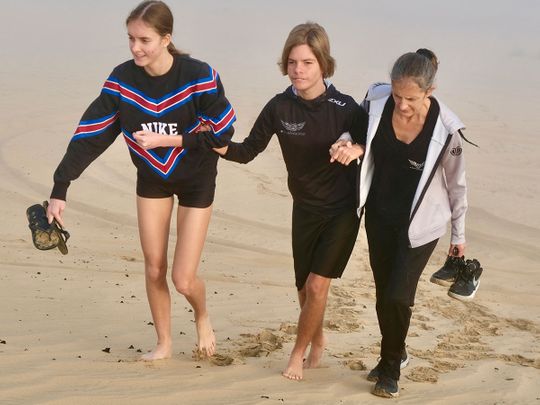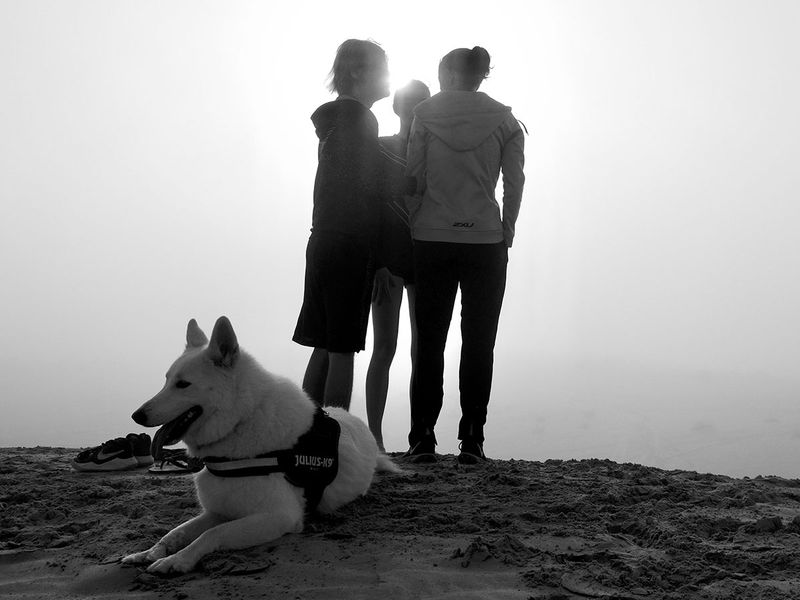
The baby was blue and not moving when first-time mum Delphine Watson and her husband rushed him to the hospital. “We thought we were dealing with cot death,” recalls the British expat in an interview with Gulf News.
But this sudden unresponsiveness seemed to have rectified itself by the time the terrified parents got to the medical centre. “We rushed down to the hospital and by the time we got there he was fine. And at the hospital they decided he was fine,” she says.
Over the next few days, the episode would repeat; a stillness of breath, a limpness of the body, and then just as unannounced, it would disappear. One of these events happened in the hospital, recalls Watson, and that’s when they discovered it was a seizure. “He’s 19 now and that was 18 and a half years ago –there wasn’t a specialist at that time like there is now - they advised us to go to a children’s hospital in London just to do some check-ups there. And at that point they said, ‘Look, his development is definitely delayed, we are not sure what the problem is – we can’t find the reason’. So we had to go back annually for check-ups. When he was four years old, they discovered that he had a chromosomal deletion, which is quite rare,” she says.
Rio’s condition is so rare that its name just states what it is: 1q44 deletion denovo. “It’s on chromosome one, it’s on q, 44 is the tiny deletion and denovo means it’s not inherited,” says Watson with the practiced air of someone who has explained it many times before.
Chromosomes are structures found in the nucleus of the body’s cells. Every chromosome contains thousands of genes which may be thought of as individual instruction booklets (or recipes) that contain all the genetic information telling the body how to develop, grow and function. Chromosomes (and genes) usually come in pairs with one half of each chromosome pair being inherited from each parent.
Each chromosome has a short or petit (p) arm and a long (q) arm. Chromosome 1 is the largest chromosome and represents about 8 per cent of the total DNA in cells.
People with a 1q4 deletion have one intact chromosome 1, but a piece from the long arm of the other copy is missing or deleted. The region 1q4 includes all of those bands in the long arm that begin with ‘q4’ and therefore include the bands q41 … q44
The first published description of a person with a 1q4 deletion was in 1976. There have since been over 50 cases reported in the medical literature worldwide. 1q44 microdeletion syndrome is associated with facial dysmorphism, developmental delay, in particular of expressive speech, seizures and hypotonia.
During those first rounds of the hospital, the Watsons exchanged shock for disbelief, which they swapped for grief at what was and what would never be; and settled on determination. It was the steely resolve of a parent determined to help their child live the best life they can, even if it means shelving a part of yourself. “When you plan a life, when you are pregnant for the first time, you imagine you are going to have this life and all these amazing things you are going to do with your child and then when that day comes and you realise that that’s not going to happen, you realise there’s a grief process. Not that you love your child any less but you realise that life is going to be very different to what you had imagined.
“For me, my whole life has been dedicated to him. You know, I feel blessed that I had a great life and experiences when I was younger but now I feel I have to dedicate myself so he can have his life. I have lost my identity and time for me and all those things, and that’s a grief in itself; it’s difficult … We’ve chosen for Rio not to be in any form of institutional care, so that means that I look after him,” she says.
Watson also homeschools her second child, 15-year-old Tia, who is every at ease with her brother’s disability. “For her, that’s just how her brother is. I don’t think that’s a conversation we’ve ever had to have apart from explaining what his condition is. She’s automatically gone and done things for him. We are a very transparent family that always talk about things to each other but I’ve never had to say, ‘Your brother is disabled’, because she’s known it – it’s been a part of her life.”
A few years ago, the family decided to create awareness and promote inclusivity for people with determination, starting Team Angel Wolf, a not-for-profit Dubai-based group.

Cancerous cells a concern
And so the Watsons were quite a busy set. Up until last November when a regular check-up brought some unsettling news: an ultrasound pointed to abnormal cells in Watson’s breast. It turned out to be pre-cancerous and required treatment. “I had a lumpectomy and radiotherapy treatment but just the logistics of treatment and looking after my son, and homeschooling my daughter were a nightmare,” she says.
“But then that’s when you have to call out for friends and you have to ask for help, which I’m very good at … I had to kind of overcome that,” she laughs.
It also boiled to the surface some unpleasant truths. “I remember lying on the radiotherapy table and thinking how I’m not looking after Rio, how I’m not looking after my daughter – and I’m thinking, ‘This is probably the first time in ages I’ve had a moment to myself’. Then I was really upset and angry, thinking, ‘The only time I’m getting time to myself is when I’m getting treatment I’m not actually wanting to do; it’s not particularly pleasant.’ And that’s a bit of a wakeup call, because you always know you should look after yourself and do things for yourself, but logistically trying to do that is not as easy as people make it sound.
“And then you hear about these other people having treatment and being told, you must rest and recover afterwards, but there is no time to rest and recover, because I’ve got to come back and do things with him [Rio], he needs help and he needs attention, so that’s hard,” she explains.
Fear of the future
And then there was the heartrending truth that came collapsing in on her. “I know my son’s life has so much worth, meaning and value, to himself and others; so my biggest wish is that he lives a very long, healthy, happy, positive life …. but, I do not want him to outlive me. I want him to live to a good, old age, having a fulfilled life, but I do not want him to have the pain of losing me first, as I truly don’t believe he would cope or survive in this world, without me protecting him. I would rather that I be the one to suffer the excruciating unfair pain of grief and loss, than him struggling and confused by why I am not there anymore, and then trying to survive in a world that still often appears cold and very prejudiced towards people with intellectual disabilities,” she writes in a confessional letter.
She writes: “My mother, when she was 49 years old, they found she had pancreatic cancer, they gave her two weeks to live and she died two weeks later; so reaching closer to her age when she died and facing my present situation, it has made me face reality …. and I don’t like it.”
As she contends with her own mortality, she writes: “Change with inclusion and accessibility I know is happening, but it is not yet enough and is not happening fast enough for me. I have been observing the changes in inclusion throughout my own lifetime. I also have an older sister who is visually impaired/blind; since I was a child, I have witnessed areas of life that is not accessible for all and could never understand why, and I need it to happen quicker, like it is for other minority groups. It is all taking far too long.”
Small things lead to inclusivity
“My wish is that I lived in a truly more inclusive world, where everyone is treated with equity and community was a real community looking out/after each other; where people saw that we are in this journey together, not each for their own - a real community of togetherness.”
Watson adds: “I know that there are many incredible experts and organisations out there doing amazing, wonderful work for inclusion and accessibility, people doing kind acts and all helping to make great change, for which I am so grateful; but I also know, hear, see, read and witness the other side of society, the major flaws where not enough to protect an inclusive world is happening. I fight that fight every single day for inclusion and accessibility within the world on so many simple layers of life, just for my own son; to the point I am exhausted.
“If big change is to happen in my lifetime, then it needs to happen quicker, for me to feel safe leaving Rio.,” she writes.
For now, she looks fondly at her baby boy and is brought back to the present. “He’s been my biggest guru in life, I think … it’s very easy to live in the past being angry or upset all the time, or to live in the future…. but then when I look at him and it just kind of comes back, you’ve got to trust the process. He lives in the now. You see all these people doing all these meditations and different things and it’s all about living in the now. And he lives every day like that.
“He may be unhappy for one moment but as soon as the moment has passed he’s happy again. I think if we could all live like him, it’d be a happier world.”
Tell us about your parenting journey by writing in to parenting@gulfnews.com








